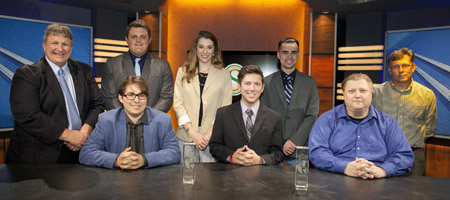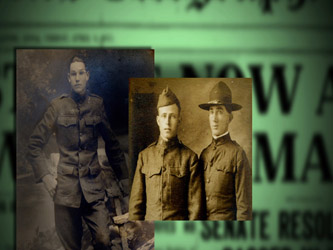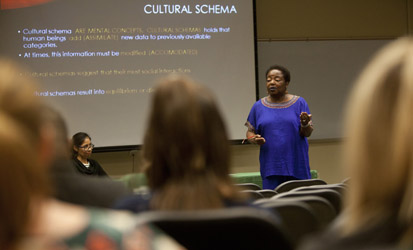|
Faculty and students participate in Gulf South History and Humanities Conference
Faculty, graduate students, and undergraduates in the Department of History and Political
Science (HIPS), the Department of Biological Sciences, the Department of English,
and the Department of Sociology and Criminal Justice played a major role in the Gulf
South History and Humanities Conference held at the Downtown Hilton in Baton Rouge
October 4-6.
Ronald Traylor (HIPS) completed his term as President of the Gulf South Historical
Association. Samuel Hyde (HIPS), who is the current Treasurer and represents Southeastern
on the Board of Directors, along with Traylor, served as Convention Chairman and received
the 2018 Michael V. R. Thomason Book Award for the substantially revised second edition
of his first book, which LSU Press published this year as Pistols and Politics, Feuds,
Factions, and the Struggle for Order in Louisiana’s Florida Parishes, 1810-1935 (the
first edition stopped at 1899).
Jonathan Ricau, a recent Southeastern History M.A., received the 2018 William
H. Coker Award for the best student paper, “The Loyal Colony: West Florida’s Dependence
on Great Britain During the American Revolution,” presented in a session, “Revolution
and Economic Development in the Early National Period,” chaired by Benjamin Price
(HIPS).
John Boulahanis (Sociology and Criminal Justice) chaired a session, “Interpreting
Exceptionally Violent Regions and Individuals in the Gulf South,” which included Hyde’s
paper, “America’s Most Violent Rural Region: Feuding, Race Riots, and Ethnic Cleansing
in Louisiana’s Florida Parishes, 1896-1935.”
Al Dranguet (HIPS) chaired the session “Sporting Events and Their Implications
in the Gulf South.” Keith Finley (HIPS) chaired the session “Slavery and the Civil
War Through the Lens of Primary Sources,” which included Traylor’s paper titled “Slave
Research Using Primary Documents.”
Hyde chaired the session “Vanishing Louisiana: The Turtle Cove Research Station
Confronts Coastal Erosion,” that included papers by biology graduate students Lindy
Muse, “Wetland research Findings and Resources in Southeast Louisiana,” and Tyler
Stevens, “Ecological responses to a recently developed Breakwater Jetty in Lake Pontchartrain,
Louisiana,” Also, Robert Moreau (Biology) screened his new film “Troubled Waters:
A History of Manchac Ecosystem and Turtle Cove,” which involved Dranguet, Hyde, Southeastern
History M.A. Steve Zaffuto (Southeastern Channel), and M.A. candidate Alex White.
Dr. Sarah Hyde of River Parishes Community College, a Southeastern History B.A.,
chaired the session “Warfare, Diplomacy, and Social Change in the Creek Nation.” Traylor
chaired the session, “Equal Rights and the Evolution of Occupational Privilege.” Jared
Wells of Nicholls State University, a Southeastern History M.A., chaired a session,
“Capital Punishment and Popular Culture in the Post-World War II South.” Karen Williams
of LSU, a Southeastern English M.A., chaired the session “Disaster, Disorder, and
Telling What Matters: History and the Fictional South,” which included a paper by
Kent Wascom (English) titled “Human History versus Environmental History in the Gulf
South.”
A session on “New Orleans in the World of 1718: A Tricentennial Reconsideration”
included papers by Samantha Cavell (HIPS), “Big Business in the Not-So-Big Easy: The
Compagnie des Indes and Merchant Shipping in Nouvelle-Orleans;” Charles Elliott (HIPS),
“Right Place, Right Time: Gulf South Geopolitics and the Founding of New Orleans in
1718;” and William B. Robison (HIPS), “Tulips, Trade, and Trackless Lands: John Law,
Louisiana, and the Mississippi Bubble in Long-Term International Perspective.”
A session on “Perspectives on 19th Century Military Service in the Gulf South”
included papers by Southeastern History M.A. and LSU Ph.D. candidate Chase Tomlin,
“‘Truly in a Sorry Plight:’ Soldiering, Service, and Sacrifice in the Mexican American
War,” and Southeastern undergraduate Joseph Ricci (HIPS), “Chaplains of the Confederacy.”
A session titled “Desegregation and Resistance in the Gulf South” included papers
by Finley, “Integration Comes to Southeastern Louisiana College,” and M.A candidate
Chad Duffaut (HIPS) “Obstruction: A Survey of African American Golfers and the Desegregation
of Golf Courses in the Gulf South.”
The session “Accuracy and Sustainability in Gulf South Museums” included papers
by Victoria Mocsary (HIPS), “The Hungarian Museum of Louisiana, Fact and Fiction,”
and Southeastern History M.A. Cody Scallions, Curator of the City of Carrolton Museum,
Tex., “Sustainability and Small Museums.”

|
|
Southeastern Channel students honored with Emmys
For the sixth straight year, students at the Southeastern Channel, Southeastern’s
educational access station, have been honored with college division Student Production
Awards given by the Emmy Awards’ Suncoast Region of the National Academy of Television
Arts and Sciences.
John Sartori of Mandeville was a winner in the “Talent” category, while Justin
Redman of Slidell, Ben Delbert of Covington and Jonathan Calhoun of Baton Rouge were
winners for their production in the “Commercial” category.
Sartori won for his on-camera composite of Southeastern Channel work that included
anchoring and reporting for the national award-winning “Big Game” sportscast, hosting
and producing the “Lion Tracks” coaches’ talk show, and play-by-play announcing of
live Southeastern game broadcasts.
“If you are a student interested in broadcast journalism, there is no better
place for you in this country than in Hammond, La., at the Southeastern Channel,”
Sartori said. “I have been given opportunities that I could have only dreamed of before
entering college.”
Read more
 STUDENTS HONORED WITH EMMYS - Southeastern Channel students were recently honored by the Suncoast Emmys of the
National Academy of Television Arts and Sciences with two Student Production Awards
and four honorable mentions. Seated from left are Ben Delbert of Covington, John Sartori
of Mandeville, and Justin Redman of Slidell. Standing, from left, are Southeastern
Channel General Manager Rick Settoon, Wesley Boone of Alexandria, Amanda Kitch of
Covington, Freddie Rosario of Hahnville, and Southeastern Channel Operations Manager
Steve Zaffuto, a course instructor. STUDENTS HONORED WITH EMMYS - Southeastern Channel students were recently honored by the Suncoast Emmys of the
National Academy of Television Arts and Sciences with two Student Production Awards
and four honorable mentions. Seated from left are Ben Delbert of Covington, John Sartori
of Mandeville, and Justin Redman of Slidell. Standing, from left, are Southeastern
Channel General Manager Rick Settoon, Wesley Boone of Alexandria, Amanda Kitch of
Covington, Freddie Rosario of Hahnville, and Southeastern Channel Operations Manager
Steve Zaffuto, a course instructor.
|
|
|

Southeastern Channel to air new episode on World War I in the Florida Parishes
 The little-known impact of World War I on the Florida Parishes is explored in a new
episode of the Southeastern Channel’s award-winning history series “The Florida Parish
Chronicles.” The little-known impact of World War I on the Florida Parishes is explored in a new
episode of the Southeastern Channel’s award-winning history series “The Florida Parish
Chronicles.”
“Southeast Louisiana and the Horror of World War I” will debut on the channel
at 8 pm. on Saturday, Nov. 3. The Southeastern Channel, Southeastern Louisiana University’s
educational access station, airs on Spectrum Cable 199 in Tangipahoa, St. Tammany,
Livingston and St. Helena parishes. The 24-7 simulcast also streams live on the channel’s
website at thesoutheasternchannel.com.
Southeastern Channel General Manager Rick Settoon said the episode is a partnership
between the channel and Southeastern’s Center for Southeast Louisiana Studies that
is currently displaying a new exhibit to commemorate the centennial of World War I.
Sporting a mock trench, battlefield diorama and a number of war-related items and
artifacts, including letters home from local soldiers, the exhibit focuses on the
wide range of implications of the war at home and in Europe. The display is located
on the third floor of Southeastern’s Sims Memorial Library.
“Since it is the centennial of World War I and, relative to other wars, the actual
impacts and horrors have received little attention, we wanted to preserve for our
viewers the memory and appreciation of those long-deceased soldiers and the great
price they paid for our country,” Settoon said. “We feel that our show not only complements,
but also highlights the outstanding World War I exhibit currently on display at the
Center for Southeast Louisiana Studies.”
The episode was written by show host Samuel Hyde, Southeastern’s Leon Ford Endowed
Chair, history professor, and director of the Center for Southeast Louisiana Studies.
“Alternately known as the Great War and the War to End All Wars at the time,
in many senses World War I ushered in the era of modern industrial warfare,” Hyde
said. “Yet the implications of the transforming event are far less visible than the
attention-grabbing details of World War II. Everyone is familiar with the major events
of World War II.”
Hyde said that the two main reasons for the limited attention focused on World
War I are the close proximity in time of the Great Depression and outbreak of World
War II and the incredible suffering the soldiers endured during the Great War.
“Service in World War I was a horrifying experience,” Hyde said. “Not only were
the soldiers subjected to unprecedented slaughter and misery in the trenches, but
in the end it solved few of the problems that challenged the world before its outbreak,
and it created conditions that led to the next great conflict.”
The episode reflects extensive research by Hyde and the Center for Southeast
Louisiana Studies staff, along with additional visual research by Steve Zaffuto, Southeastern
Channel operations manager, who directed, shot, edited and created animations for
program.
The show includes period footage of war era film, along with scores of images
from the front lines and on the home front. Action sequences use Southeastern graduate
students and faculty, along with other actors.
The program also spotlights an interview with Southeastern history professor
Samantha Cavell, a World War I expert and descendant of Australian soldiers who fought
in the famed ANZACS division during World War I.
Settoon said the episode will air multiple times on the Southeastern Channel
through Armistice Day, Nov. 11, which is the day World War I ended in 1918.
The Southeastern Channel has won over 400 national, international and regional
awards in its 15 years of existence, including 17 awards from the Emmys with 62 nominations.
Video on Demand is available at thesoutheasternchannel.com.
|
|

Teaching and Learning presents professional development session
 The College of Education’s Department of Teaching and Learning partnered with other
educators across campus and with the student organization Cultural Connections to
present a professional development session titled “Instructional, Institutional, and
Sociopolitical Challenges for Multicultural Teachers” last week. The College of Education’s Department of Teaching and Learning partnered with other
educators across campus and with the student organization Cultural Connections to
present a professional development session titled “Instructional, Institutional, and
Sociopolitical Challenges for Multicultural Teachers” last week.
The session provided an anthropological perspective by integrating Lucy, representing
the three million-year-old hominid skeleton discovered in 1978, into the discussion
while also referencing the role of women as knowledge sharers and storytellers.
This session also included voices from female university educators that discussed
contemporary issues that are culturally embedded, as well as vocal performances by
members of Cultural Connections. It focused on the historical and contemporary views
of cultural relativism, along with challenges for 21st Century teachers.
Since the Department of Teaching and Learning recognizes the cultural complexities
within teaching and learning, they continuously work to engage, share, and inform
teacher education candidates by offering diverse professional development opportunities.
|
|